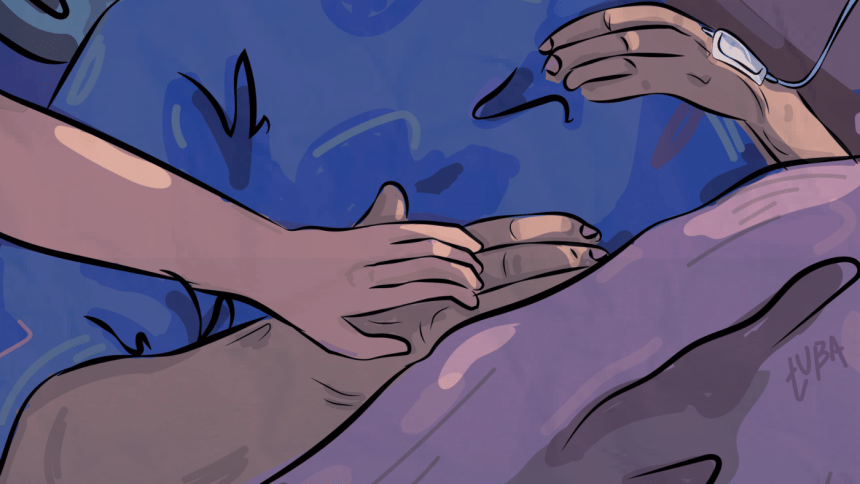Caring for ailing parents: A daunting reality

On a Friday afternoon, I stumbled through emergency units at three different hospitals seeking urgent medical attention for my ill parent, only to be turned away because there were no on-duty doctors and operational diagnostic equipment. As I look back on my parent's complicated medical history, an ugly experience like this is just the tip of the iceberg.
Life prematurely comes full circle for young people who have ill parents. Their lives become an uphill battle of hustling to succeed in a competitive world while juggling responsibilities towards their sick parents.
Faria Rashid Luva, 20, a student at North South University, says, "My mother had to stay at the hospital after a drug for her eye infection had caused terrible side effects. I stayed with her in her hospital cabin. I had to learn how to cook and travel by myself. I brought food to the hospital. I periodically changed her IV drips while being responsible for her hygiene."
Sholpita Ashfaque, 20, a student at Chittagong Medical College, shares that her father suffered two strokes in the span of 3 years. She says, "After my father suffered a second stroke in 2019, he developed neuropathy and vascular dementia. He slowly lost his memories, his ability to walk and talk. My brother gets posted to different cities due to his job so I was left to tend to abbu, whether it involved taking him to the hospital, helping him use the bathroom or taking him out on walks."
She adds, "Initially, we didn't know much about the extent of my father's issues. There were many times when I saw my mother cry while cradling my bleeding father after he had fallen down and injured himself. I used to get nightmares and had trouble sleeping. To cope, I started reading up on his condition to better understand the symptoms that cropped up."
This is not an uncommon sentiment for children growing up with ailing parents. According to Sharmin Haque, clinical psychologist at Square Hospital, parental illness throws a curveball in the intricately layered development of a young person, "A child with a diseased parent grows up with insecurities and feelings of unfairness because they don't share a normal relationship with their parent. They hesitate sharing their distress and can gradually slip into anxiety and depressive thoughts. In selective cases, such children are at risk to develop mood disorders, empty feelings or even personality disorders when they become adults."
She further adds that such individuals go through a change in personality patterns as they anticipate negative outcomes from their ill parent's prognosis. Younger children lack self-efficacy growing up and may even resort to imagining scenarios to cope.
In this context, Munzarin Islam*, 18, a student at North South University shares, "In class seven, when I was told my mother has been diagnosed with Carcinoma, a type of cancer, I didn't understand it well enough and thought it would get better soon. My family decided to pursue cancer treatment at Singapore after being administered the wrong drugs at a hospital in Dhaka. My parents periodically left Bangladesh for treatment and I'd stay back with my grandparents. I slowly grew introverted, rarely talked to others although I was once very outgoing. I became an absentee student at school."
When a parent struggles with chronic diseases, their children often have to come to terms with the fact that their parent may not be able to play conventional parental roles in their lives.
Parvin Akter, 48, is a mother of two, who shares her experiences living with permanent cognitive impairment after suffering from severe Encephalitis, an uncommon but serious condition in which the brain becomes inflamed, "I'm unable to go anywhere by myself because I can't remember identities, places and directions. I depend on my children or husband to accompany me outside. But they often can't make time due to studies and work. These days, I rarely go out. Sometimes, it's suffocating and lonely to be cooped up in the house. Nothing gives me joy. I'm usually too disoriented to function and perform responsibilities like I used to. I fail to keep tabs on my children. I can't keep up with developments in their lives due to short-term memory loss and crippling headaches. They also no longer keep expectations from me or ask for my advice."
When it comes to getting parents appropriate medical attention, youths are limited by their lack of connections and inexperience in dealing with our dysfunctional medical facilities. Aside from the inability to bear steep out-of-pocket medical bills, they lack the agency to sort bottlenecks in administrative procedures, smooth over communication and manage complicated paperwork.
Muslima Jannat Eva, a Rajuk Uttara Model College alumnus, shares, "We had to consult 4 different doctors before my mother's gall bladder tumour finally got diagnosed. She had severe symptomatic jaundice and hence was advised to opt for immediate surgery. We booked a surgery appointment at a government hospital in Dhaka but they scheduled it after a month due to lack of surgical capacity. We had no choice but to shift her to a private hospital for the urgent procedure."
When asked about her experiences, Rameesa Jameel, a recent graduate from a renowned private university in Dhaka, says, "My father has to receive regular physiotherapy and acupuncture treatments for paralysis after a road accident. Unfortunately in our healthcare industry, there's a shortage of skilled professionals in both of the aforementioned fields. Apart from the professionals at CRP (Centre for the Rehabilitation of the Paralysed), physiotherapists with personal practices tend to have less experience with treating paralysed individuals, being more accustomed to treating ageing individuals with joint and muscle stiffness."
She adds further, "I've also observed the lack of development related assisted living services in our healthcare industry. Most employees in this sector receive little to no training in caregiving, largely due to their employers' lack of understanding regarding caregiving services, and are expected to learn on the job which is inconvenient for both parties: the caregiver and the patient."
Tasfia Fairuz*, a 23 year-old student at Bangladesh University of Engineering Technology, recollects her experience growing up with grandparents who had dementia and Alzheimer's. She notes that diagnostic procedure and therapy pertaining to neurological illnesses are too expensive for most families. She wishes there were more developed assisted living facilities devoted to housing and caring for ageing patients with different disorders.
Since 1982, our country has had no updated ordinance that could decree regulation of private medical facilities. Public hospitals are plagued by absence of healthcare providers, overflowing patients and rundown equipment. Registered diagnostic centres are licensed as separate medical entities. These facilities often put arbitrary hefty price tags on their services and articulate exploitive policies.
According to a survey by Transparency International Bangladesh (TIB), some healthcare providers follow marketing tactics and refer patients to medical services in exchange for commission worth 25-50 percent of those services from relevant medical companies. As a result, patients often get recommended unnecessary procedures at questionable facilities.
The medical sector is riddled with nuanced and intricate problems, the navigation of which is difficult for seasoned adults. When a parent falls sick, however, it often falls on a young person to solve these problems and foresee many troubles, which becomes daunting given the fact that the medical care is for a parent.
The worst part of growing up with a sick parent in our country is the accompanying anxiety that your parent might not get the medical assistance they need. A reliable healthcare system can take the heavy burden off of many shoulders.
*Names have been changed upon request
Reference:
1. Transparency International Bangladesh. (February, 2018) Private healthcare: Governance challenges and way out
Nuzha forgives people for pronouncing her name wrong and wallows in books and anxiety. Suggest her fiction at [email protected]

 For all latest news, follow The Daily Star's Google News channel.
For all latest news, follow The Daily Star's Google News channel. 








Comments